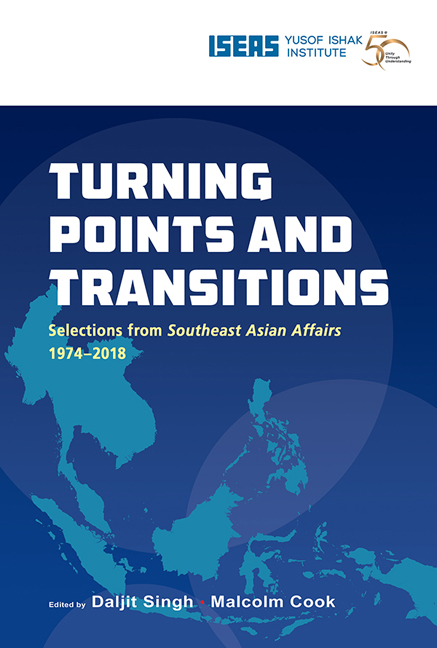Book contents
- Frontmatter
- Contents
- Message from the Director
- Foreword
- Foreword
- Introduction
- THE REGION
- BRUNEI
- CAMBODIA
- INDONESIA
- LAOS
- MALAYSIA
- MYANMAR
- THE PHILIPPINES
- SINGAPORE
- THAILAND
- The Revolutionary Situation in Thailand (1975)
- American Military Withdrawal from Thailand (1976)
- The Thai Economy: From Boom to Gloom? (1997)
- Thailand: A Year of Diminishing Expectations (1999)
- Thailand: A Reckoning with History Begins (2007)
- What Went Wrong with the Thai Democracy? (2015)
- VIETNAM
What Went Wrong with the Thai Democracy? (2015)
from THAILAND
Published online by Cambridge University Press: 29 May 2019
- Frontmatter
- Contents
- Message from the Director
- Foreword
- Foreword
- Introduction
- THE REGION
- BRUNEI
- CAMBODIA
- INDONESIA
- LAOS
- MALAYSIA
- MYANMAR
- THE PHILIPPINES
- SINGAPORE
- THAILAND
- The Revolutionary Situation in Thailand (1975)
- American Military Withdrawal from Thailand (1976)
- The Thai Economy: From Boom to Gloom? (1997)
- Thailand: A Year of Diminishing Expectations (1999)
- Thailand: A Reckoning with History Begins (2007)
- What Went Wrong with the Thai Democracy? (2015)
- VIETNAM
Summary
The coup on 22 May 2014 in Thailand has, for the present, caused a break in the political divide and impasse, a problem that the previous elected government was unable to solve. Many were worried that the deeply entrenched political polarization which had existed for almost a decade would lead to bloodshed if it was allowed to continue. So many questions were asked on what went wrong with the presumed Thai democracy. Why did the coup happen? What would be the future of democracy in Thailand? How can it be consolidated? These questions reflect that Thailand is facing a serious problem of democratic consolidation.
Many scholars on democratization agree that the road to a stable democracy is not always smooth. They agree that democratic consolidation in many countries is not an easy task, and Thailand is no exception.
Democratic consolidation depends on a variety of factors which vary from one country to another. Nonetheless, one of the major causes for the instability of a democratic regime is related to political legitimacy. Any political regime which does not secure legitimacy will find it hard to survive since its legitimacy depends on its acceptance by its citizens as expressed through major political forces. There is no need at this stage to debate in detail here how to develop and fortify a democratic regime's legitimacy. However, it is accepted that the essential requirement for strengthening such legitimacy is the regime's effectiveness in meeting the needs of its people and the implementation of democratic values, practices and procedures.
Political Polarization and the Crisis of Political Legitimacy
In the case of Thailand during the past decade, we have witnessed a deeply entrenched political polarization which had never reached such extreme levels in the past. This divisiveness, initially caused by a conflict between the pro- and anti- Thaksin groups, later developed into a crisis of political legitimacy. The anti-Thaksin group was formed around 2001 by a mass media tycoon, Sonthi Limthongkul, and later joined by some prominent political elites, notably Chamlong Srimuang, former Governor of Bangkok. In the beginning, the group was composed of thousands from the urban middle class and some upper-middle class who believed that Thaksin was leading the country towards one party rule.
- Type
- Chapter
- Information
- Turning Points and TransitionsSelections from Southeast Asian Affairs 1974-2018, pp. 702 - 710Publisher: ISEAS–Yusof Ishak InstitutePrint publication year: 2018

